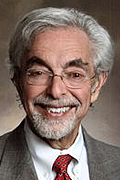SHARE:

Jerry Osteryoung
Small Business Advice
Using the 'Rotary Four-Way Test' will make your business stronger
"The character ethic, which I believe to be the foundation of success, teaches that there are basic principles of effective living, and that people can only experience true success and enduring happiness as they learn and integrate these principles into their basic character." ~ Stephen Covey
As a Rotarian, the Rotary Four Way Test has been so important to me in the way I try to live my life as well as the way I assist companies. The Test is composed of four powerful statements -- Is it the truth? Is it fair to all concerned? Will it build goodwill and better friendships? Will it be beneficial to all concerned? -- and these are wonderful guiding principles for businesses and individuals, alike.
The Four Way Test was written by Chicago Rotarian Herbert J. Taylor in 1932 for the bankrupt Club Aluminum Company. Herb was president of this very sick and financially desperate company and he said,
To win our way out of this situation, I reasoned we must be morally and ethically strong. I knew that in right there was might. I felt that if we could get our employees to think right, they would do right. We needed some sort of ethical yardstick that everybody in the company could memorize and apply to what we thought, said, and did in our relations to others.
These were the beliefs out of which the Four Way Test was born, and Herb consulted these principles in every company decision. For example, when an advertising concept declaring his aluminum product “the greatest cooking ware in the world” was put in front of him, Herb rejected it saying, “We can’t prove that.” The ad was rewritten to simply state the facts.
In five years, Club Aluminum had pulled itself out of the red, and much of the credit went to the Four Way Test.
The Four Way Test was also adopted by Charles R. Walgreen, Jr. in 1955 for the company his father founded. This is considered one of his most enduring contributions to the company. These four questions became the foundation of the Walgreens way of doing business, and to this day, you are likely to see the Four Way Test hanging on the wall of almost any Walgreens in the United States.
- The first statement in the Four Way Test is, “Is it the truth?” Telling the truth -- better yet, not telling lies or embellishing the truth -- is so important for individuals as well as businesses. People and businesses who do not follow this principle may thrive in the short term, but I believe they will suffer dearly in the long term.
In my personal experience, I have learned over the years that if I am not completely truthful in my advice to the businesses I am helping, they will lose in the end. It is so hard to tell an entrepreneur their idea for a new product or business will never work, but if I withhold that information to spare their feelings, I am doing them a terrible injustice. - The second statement in the Four Way Test is, “Is it fair to all concerned?” When faced with an important decision, it is so easy to see only the people directly affected and forget about the others who might also be impacted. For example, a company was looking into changing its payment system to improve their cash flow. Under the new system, vendors who would normally get paid in 15 days would now get paid in 30 days.
The company was only considering how this change would improve their situation and not taking into account the impact it would have on their vendors. Simply put, this policy did not pass the Four Way Test because it was not fair to all concerned. - The third statement in the Four Way Test is, “Will it build goodwill and better friendships?” Kit Lindsay, owner of Lindsay Transmission in Warrensburg, Mo. was dealing with a visitor in town who needed repairs on his motor home. Another local shop had told the visitor he would need a complete transmission replacement, but Lindsay fixed the problem for $200. "We have a saying at my business,” Lindsay said. “We do what's right."
- The final step in the Four Way Test is, “Will it be beneficial to all concerned?” Mike Sheridan, founder and chairman of the board of FBMC Benefits Management in Tallahassee, was faced with a tough decision when the economy tanked in 2008 and staff was looking at layoffs to conserve cash.
Though business revenue had fallen, Mike said no employees would be let go. He knew that laying off employees would have terrible consequences for the employees’ families and the community. Mike clearly understands the Four Way Test and always operates his business within these guiding principles.
Now go out and make sure you are following the tenets of the Four Way Test, as doing so will really make your business so much stronger.
You can do this.
Jerry Osteryoung is a consultant to businesses - he has directly assisted over 3,000 firms. He is the Jim Moran Professor of Entrepreneurship (Emeritus) and Professor of Finance (Emeritus) at Florida State University. He was the founding Executive Director of The Jim Moran Institute and served in that position from 1995 through 2008. His newest book co-authored with Tim O'Brien, "If You Have Employees, You Really Need This Book," is an Amazon.com bestseller. He can be reached by e-mail at jerry.osteryoung@gmail.com.






 - Free Downloads
- Free Downloads
